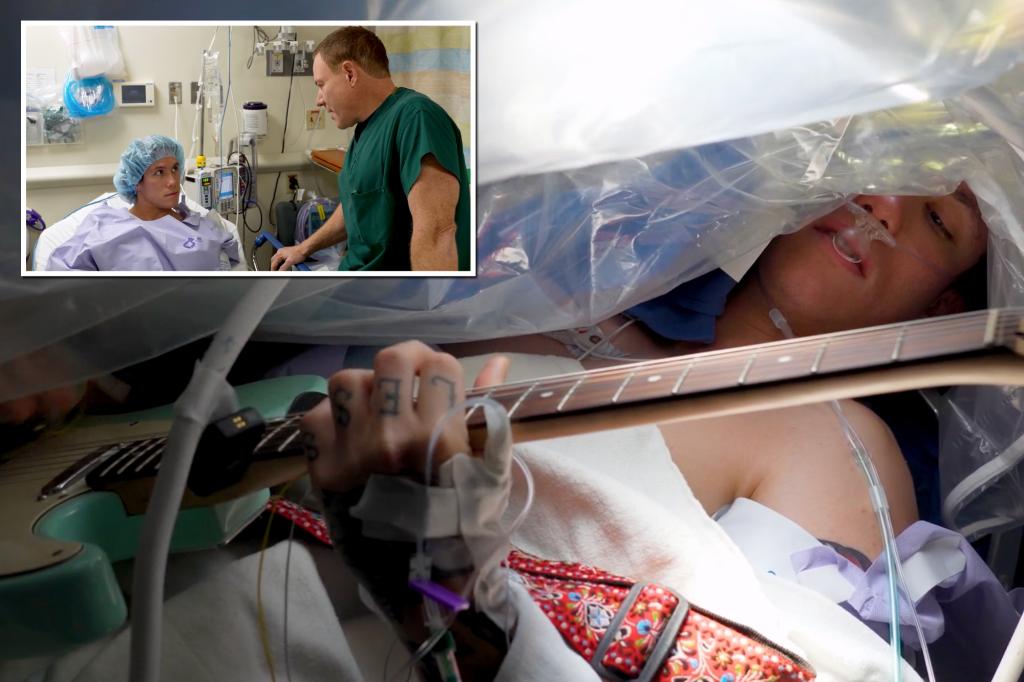
The idea of undergoing brain surgery while awake may seem amazing enough — but one Florida man took it a step further and played guitar while doctors removed his tumor.
The neurological team from the Sylvester Comprehensive Cancer Center at the University of Miami Miller School of Medicine wanted the patient, Christian Nolen, to play notes on an instrument so they could assess and protect his manual dexterity while being as aggressive as possible in removing the tumor.
The surgeon and the patient both spoke to Fox News Digital about the experience.
Nolen, who is an avid guitarist, has a tumor in the right frontal lobe of his brain that is beginning to cause symptoms.
“Christian is having problems with the left side of his body, especially his left hand,” Ricardo Komotar, MD, director of the brain tumor program at Sylvester, told Fox News Digital via Zoom.
“He noticed a problem with his dexterity that affected his ability to play the guitar.”
Christian Nolen played his guitar through his brain surgery. Sylvester Comprehensive Cancer Center at the University of Miami Miller School of Medicine
Nolen needed surgery to confirm the diagnosis and determine the type of tumor — because each tumor has different treatment options, Komotar noted — and also to remove as much as possible.
The surgery was scheduled for 10 days after the tumor was discovered — and Nolen was surprised when doctors asked if he was willing to stay awake and play guitar for the procedure.
“When a tumor involves or is near a critical part of the brain – something that controls the ability to speak or understand language or move – we want to do awake surgery to continue to monitor the patient, so you know if you’re starting to violate normal brain function,” said Komotar.
When the patient is asleep, doctors say, the surgical team has no ability to get feedback.
“The surgery actually becomes more dangerous because you can remove a tumor that involves normal brain function and cause real harm without knowing it,” he said.
Given the importance of playing the guitar in Nolen’s quality of life, Komotar said there is “no better way” to monitor his manual dexterity and the impact of the tumor than to have him pick up the instrument in the operating room.
When doctors presented the options to Nolen, he said at first it “seemed unreal.”
“I’ve only really heard of procedures like that being done in shows and movies,” he told Fox News Digital in an email. “I think it’s a unique experience that I can’t pass up – especially with my motor skills on the line.”
He added, “The risk of being sedated for the entire procedure outweighs any fear or anxiety about the procedure itself.”
Before the procedure, Nolen said he was introduced to members of the surgical team and told in depth about what to expect.
The anesthesiology team put Nolen to sleep for the start of the open craniotomy, but he was awakened during the delicate part of the two-hour procedure. Once he was oriented to what was happening, the care team gave Nolen a guitar and asked him to play.
Awake anesthesia is recommended when the tumor is close to an important segment of the brain. Sylvester Comprehensive Cancer Center at the University of Miami Miller School of Medicine
“Upon waking up, it was quite overwhelming to look at everything around me and fight the natural reaction to sit down,” Nolen recalls.
After one of the care team members put a “calm hand” to stop Nolen from sitting up, she said it only took a moment for her to remember what happened.
“I just need to breathe and calm down,” he said.
Start your day with everything you need to know
Morning Report delivers the latest news, videos, photos and more.
During the surgery, he tried his best to play some of the songs he practiced, including songs by artists like Deftones and System of a Down.
While surgeons removed the tumor, they continued to monitor Nolen’s hand function while he played guitar.
“When we solved the case at the very back of the tumor, we found that the function of his hand started to deteriorate,” Komotar said. “The tumor touches and connects to the part of the brain that controls hand movement. Fortunately, we were able to remove the entire tumor and not injure his hand.”
“This is wild,” Nolen said during the surgery.
What to know about awake procedures
While patients playing the guitar during surgery isn’t an everyday occurrence, Komotar told Fox News Digital that he and the rest of the specialized neurosurgery team perform awake surgeries several times a week, totaling several hundred times a year.
“Most patients are interested in the process,” he said. “We tell them they will be able to talk and move their arms or limbs so we can always check on them.”
Doctors also reassure patients that they won’t feel pain, likely won’t remember the entire procedure, and will remain very comfortable — “which is a result of our world-class neuroanesthesia team,” Komotar added.
Doctors removed most of the tumor in Nolen’s brain. Sylvester Comprehensive Cancer Center at the University of Miami Miller School of Medicine
Research has proven the benefits of performing the procedure with awake anesthesia instead of deep general anesthesia, doctors said.
“Surgery with ongoing neurological examination leads to better functional outcomes and less neurological deficit,” he said.
There are also improvements in emissions and recovery.
“The less anesthesia you use during your procedure, the better the patient wakes up,” he says. “The sooner they get up, the sooner they get up and walk around, and the sooner they come home.”
Komotar added, “And indeed, the longer you stay in the hospital, the more complications you have.”
Playing the guitar is not the only activity that a patient can do during a craniotomy while awake.
Anything that doesn’t increase the pressure on the head, like playing the violin, is fair game, says Komotar.
Some patients sing during brain surgery, which allows surgeons to monitor their ability to form and understand words while they remove tumors in areas that involve language.
There are some risks involved with awake cranial surgery, Komotar admits.
“Seizures can definitely be worse with awake surgery,” he told Fox News Digital. “If someone has a history of seizures, we try to avoid electrical brain stimulation, which is part of the technique.”
The biggest risk of performing an awake brain tumor removal is that about 5% to 10% of patients don’t “tolerate” being woken up, Komotar said.
“Even with world-class anesthesia, they may wake up either too shocked or too sick to be examined,” he said. “They may be confused, agitated or unable to follow instructions.”
If that happens, the care team puts the patient back to sleep and proceeds with more conservative tumor removal.
Without constant feedback from the patient, the surgical team cannot be aggressive with tumor removal, Komotar said. “We only release what we know is safe, and we leave out anything that is questionable.”
Nolen returned to working out and playing guitar after his surgery. Sylvester Comprehensive Cancer Center at the University of Miami Miller School of Medicine
The road to recovery
Nolen’s surgery went well and the entire tumor was removed.
“Christian did a great job,” Komotar said. “He went home the day after the surgery. He said his quality of life is better than ever, so I think his recovery is remarkable.”
The first few weeks after surgery were quite difficult for Nolen, the patient said, mainly due to the post-surgery restrictions.
“Those days really drag on,” Nolen told Fox News Digital. “However, with a strong support system, I was able to focus on the positive.”
He is now back working out at the gym and playing the guitar, with noticeable improvement in his left hand.
He is awaiting final pathology results, with follow-up treatment likely to consist of six weeks of radiation and chemotherapy.
Both Komotar and Nolen emphasize that the success of the surgery depends on the cooperation of the entire care team.
“The team at Sylvester Comprehensive Cancer Center in Miami is very informative and doesn’t leave much to the imagination in the best way,” says Nolen. “They have also provided me with several programs for emotional support.”
“Cases like this highlight the value of multidisciplinary care,” added Komotar.
“It would not be possible to remove a tumor like this and bring a patient home so quickly and in such good health without the whole comprehensive team — neuro anesthesiologists, great intensive care specialists, nurses, technicians, great oncologists — all working together -same.”
Categories: Trending
Source: thtrangdai.edu.vn/en/



